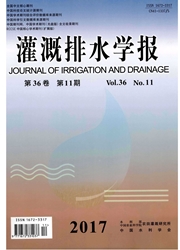

 中文摘要:
中文摘要:
通过田间试验,对比分析了滴灌和地面灌溉方式下晴天和雪天温室小气候的变化特征,分析了作物生理指标的变化。结果表明,晴天,滴灌能够降低温室内空气相对湿度,提高温室内空气温度,保持较高的过氧化氢酶活性和光合能力,作物抗逆性强;雪天,滴灌方式下温室内空气的相对湿度低于地面灌溉,但是温度变化表现一定的差异,夜间温室内空气温度较地面灌溉偏低0.02~1.41℃。低温时,滴灌方式下过氧化氢酶活性和光合作用能力的降低幅度大于地面灌溉,作物低温冷害风险增大。
 英文摘要:
英文摘要:
Variation characteristics of microclimates and plant physiological indexes in greenhouse on sunny and snowy days were analyzed comparatively under drip irrigation and surface irrigation throuth field experiments. Results showed that air and soil temperatures in greenhouse increased, and relative humidity in greenhouse decreased on a sunny day under drip irrigation. The activity of catalase (CAT), photosynthesis and the capability of stress resistance were all higher compared to surface irrigation. On a snowy day, air relative humidity in greenhouse under drip irrigation was also lower compared to surface irrigation. However, air temperature under drip irrigation was 0.02-1.41 ℃ lower than that under surface irrigation at night. The activity of catalase (CAT) and photosynthesis decreased more obviously under drip irrigation than those under surface irrigation when the temperature was low. The risk of low temperature on crop was larger under drip irrigation.
 同期刊论文项目
同期刊论文项目
 同项目期刊论文
同项目期刊论文
 期刊信息
期刊信息
